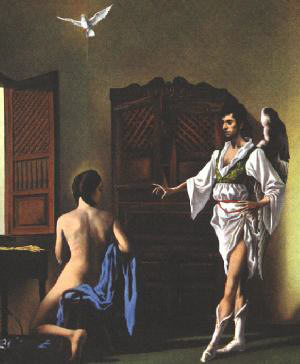Canto XXV of Paradise
 |
|---|
Jeanne was and is still, the nourrishment of my hope.
Sperent in Te.
Se mai continga che 'l poema sacro al quale ha posto mano e cielo e terra, sì che m'ha fatto per molti anni macro, vinca la crudeltà che fuor mi serra del bello ovile ov'io dormi' agnello, nimico ai lupi che li danno guerra; con altra voce omai, con altro vello ritornerò poeta, e in sul fonte del mio battesmo prenderò 'l cappello; però che ne la fede, che fa conte l'anime a Dio, quivi intra' io, e poi Pietro per lei sì mi girò la fronte.
Then, moved towards us, another light of which my Lady, full of joy, says to me: "Look at, looks at whom who comes in this light, it is Jacques, the baron of Heaven, the beautiful Galician gentleman." He came turning around Jeanne, similar to a dove near his companion girl, cooing, like if showing her his love; and, after Jeanne had succeeded in moderating his flirt, she says: "Famous Spirit, rather make resound the virtues of hope to this other one, here present, and who is very dear to Me." And the beautiful gentleman told me: "So that you can, after having known it, comfort in yourself, and to others, the hope who on earth, garanty the true love, tell Me then what is hope; tell Me how it flowers in your soul and say Me from where it came from." After one moment of reflexion, I answered to him: "Hope is unquestionable the wait fro a future happiness, which is produced by the female grace and the good that it had given so much to us. Jeanne was and still is the nourishment of my hope; and my faith in Jeanne is its unquestionable foundation." Then he answered to me: "Love which held Me in the virtue, which followed Me to martyrdom, and still follows Me, requires that I speak to you about it, to you, who delights so much about it; and it would please Me that you tell Me, what hope promise you." And I answered to him: "The souls dear to God have a goal, and, that is inscribed in the Scriptures, and this goal inspires to me, the promise of hope. Each one of these souls will be dressed with the double cloak of the beatitud of the soul and of the body." As soon as I had finished these words, one heard then: "Sperent in Te" To what answered all the glories which where dancing above us. Then, a light resplendit like a brilliant star, it was like a white yound girl who rises, and goes all naked, and enters into the marital bed, not by vanity but to transmit pleasure to the husband. Such I saw the bright splendour coming towards the two other lights, as quickly as it was appropriate to their ardent love; and my lady fixed her glance on them, like this spouse, motionless, quiet and full with desires. "Here is Jean, Whom who laied down on the bossom of the Master, and as a weeping lover, accompanied Him to His cross." Thus spoke my Lady, without detaching her glance from the bright lights. Such as whom fixes the light for a too long time, and who, to have looked at it too much, cease thus to still sees through his eyes, such I bacame, until it was told to me: "Why dazzle yourself as such, trying to see what is not here? My body is made of dust, and it will turn back to dust, and it will remain there with the others, until their number is in conformity with the eternal intentions. There is only three lights to have climbed up to the cloister of happiness with their own bodies, and you are one of these, you will let it know to those of your world who cannot listen any more." To these words, the dance of the flames stopped with the soft agreement of the sound of the three breaths, like if to avoid tiredness, rests to the sound of the alarm bell. Ah! how much I was moved in my soul, when I turned over to see Jeanne, and not to be able to see her although being close to Her, and I was submerged in Happiness!
Marco Polo ou le voyage imaginaire (La tragédie humaine, janvier 2000) © 1999 Jean-Pierre Lapointe
Theme musical: Musique de film (Philadelphia), empruntée aux Archives du Web.
Important Notice: any photos or fragments of photos subject to copyright will be removed on notice.